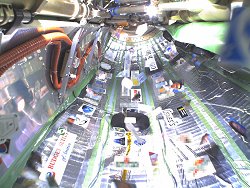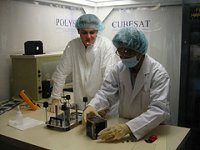|
Glenn Reynolds is Beauchamp Brogan Distinguished Professor of
Law at the University of Tennessee. He is a prolific scholar with
many publications in leading law journals. However, he is best
known as the author of the weblog, Instapundit,
one of the most widely-read American political weblogs. He also
blogs at GlennReynolds.com,
hosted by MSNBC.
Prof. Reynolds is a long time space activist and has written
extensively on space law. For example, he was a co-author on the
book Outer Space: Problems of Law and Policy (2nd ed. 1997).
He has been executive chairman of the National
Space Society and a member of the White House Advisory Panel
on Space Policy.
His most recent book is An
Army of Davids: How Markets and Technology Empower Ordinary People
to Beat Big Media, Big Government, and Other Goliaths.
It includes a chapter on space and in it he discusses how private
and commerical efforts are changing the way space exploration
and development are carried out.
Prof. Reynolds also writes frequently for TCS
Daily and his essays often deals with space related topics
such as NASA's
return to the Moon program and space
elevators.
|
|

A view from inside the Genesis 1 inflatable module currently
in orbit. The project is financed by the private company
Bigelow
Aerospace. Genesis 1 is just the first in a series of
prototypes that will lead to a large fully functional habitat
with a human crew in the 2010-2012 time frame.
(Photo credits: Bigelow
Aerospace)
|
|
|
On the side, Prof. Reynolds runs Wonderdog
Records, a music studio and production company in Knoxville,
Tennessee.
---
Prof. Reynolds was kind enough to answer my queries on space
activism, space law, and politics. I was also keen to hear more
about his views on how space development and human spaceflight
are moving from government monopolized endeavors to activies in
which private companies and the general public can participate.
|
|
|
So how did you first become
interested in space?
Reynolds:> Some of my
earliest memories are of watching Mercury and Gemini launches,
and I thought that space was cool and interesting from the beginning.
I still do.
When you first started
to pursue space law, were you advised to go instead into an area
that was more down to earth?
Reynolds:> I went to Yale
Law School, where Myres McDougal, Harold Lasswell, Ivan Vlasic
and Nick Katzenbach had done pioneering work in the 1960s, so
it didn't seem quite as farfetched as it might have elsewhere.
I wrote a paper on the subject under Eugene Rostow that was published,
so it wasn't too bad. I did get a variety of Star-Trek-themed
jokes from classmates, of course.
|
|
Are you finding much interest
in space law among the current generation of law students?
Reynolds:> Yes. I'm teaching
the course this fall and it's significantly oversubscribed.
You have been involved
with space advocacy for a long time and you devote a whole chapter
of your new book to space. Since the 1960s, space has never been
even a minor issue in the political scene except perhaps in some
districts with big NASA centers. Short of an approaching asteroid
impact or alien invasion, this looks difficult to change. How
might an army of grass roots space advocates go about moving space
development into at least the tail end of the top 10 or 15 issues
on which any candidate for a federal office is expected to have
a clearly defined position?
Reynolds:> It's very hard.
Space activism can raise the profile of issues, but you have to
deliver votes, in nontrivial quantities in key districts, to really
affect things. The good news is that space activism has been far
more effective in getting the regulatory deadwood cleared from
the path of commercial space, because with
|

The Mars
Society sponsors Mars analog stations like this one
in
Utah. Teams of volunteers carry out simulations of life
and work on a Mars base. The aim is to develop technologies
and operational techniques that could apply someday to actual
facilities on the Red Planet .
( Photo
credits: Ben Huset)
|
|

The low cost and highly successful Lunar
Prospector mission detected hydrogen in the regolith
at the lunar poles. The hydrogen is suspected to be in water
ice. The project was conceived and initially led by space
activists.
(Graphics credits:
NASA)
|
|
less pork involved members of Congress and the Executive are
more receptive to reasoned arguments than they would be where
significant dollars are involved.
In your book you strongly
recommend that the President's Space Council be reconstituted
and you list some of the general issues with which it should deal
such as over-concentration in the aerospace industry and the high
costs of space activities. If a new president in 2009 asked you
to head his or her Space Council and to lay out a set of reforms
for US space policy, what would be your top two or three recommendations?
Reynolds:> Well, I'd like
to keep the Vice President as head of the Space Council, so I
doubt I'll be offered the job . . . I'd encourage a prize-based
approach, like the X-Prize and NASA's (small) Centennial Challenge
grants. I'd also encourage more money in fairly basic R&D stuff:
materials, engine technology, the like, all focused on the needs
of commercial rather than military uses. And I'd try to promote
space tourism, as I think it's an important economic, and political,
engine for more progress in space.
|
|
I see that you are currently
on the National Space Society's board of advisors. How do you
think the NSS and other activist organizations could best take
advantage of the Internet to utilize the army of space enthusiasts
out there?
Reynolds:> Internet activism
is usually broad but shallow -- you can get people to send an
email or sign a petition or maybe donate money but it's hard to
get long-term, committed effort. I'm not sure how you solve that
problem, but I suspect that you need a sense of community to keep
people involved. That's hard, though, with the inevitable flamewars
that seem to go with Internet activity.
It was common in novels
from the golden age of space sci-fi in the 1940s and 50s to include
a rich mogul who funded the development of a spaceship or space
station or whatever else was needed to get the story off the ground.
By the 1970s such plot devices seemed quaint since everyone knew
you needed many billions of dollars and tens of thousands of government
employees to do anything of significance in space.
|
|
|
Today we actually do see rich moguls funding private spaceships
and space stations. It appears that technology has reduced the
costs of such projects while the wealth of moguls interested in
space has increased. The two trends crossed and we suddenly have
a private spaceflight industry.
If some future president decided to follow the advice of many
scientists and eliminate human spaceflight from NASA, do you think
that it is conceivable that privately funded spaceflight could
succeed on its own and get humanity permanently established in
space?
Reynolds:> Yes, it's very
much back to the future now, with people like Jeff Bezos funding
space ventures. I think that NASA is growing steadily less relevant
to the growth of human spaceflight, and I think that's probably
inevitable given NASA's bureaucratic ossification. To his credit,
Michael Griffin seems to have a firm grip on reality, and isn't
succumbing to the usual NASA temptation to snuff out anything
that might be a rival.
|

Direct-to-home (DTH) satellite TV currently has over 25
million subscribers in the US alone. Home satellite reception
began in the early 1980s when hobbyists and rural residents
began to pick off satellite signals, particularly TV programming
distributed to cable TV outlets. The growth and size of
this C-band audience convinced investors to support companies
like DishTV and DirecTV and their development of the small
dish digital systems that made sateliite TV into today's
mass market service.
|
|
I really appreciated the
theme of your book since a central tenet of my website is that
everyone can participate in space exploration and development
and that groups of enthusiasts and students can carry out ambitious
space projects. For example, amateur rocketry clubs during the
1920s and 30s made enormous contributions to the early development
of rockets. A resurgence of experimental
rocketry by amateurs and students today is continuing this
tradition of innovation. Similarly, the AMSAT
movement, which emerged from the amateur radio community, has
a long line of "firsts" in the development of microsatellites.
(The German AMSAT group even has a Mars probe in development.)
A number of participants in amateur and student space projects
have gone on to form startup companies that are building commercial
rocket vehicles and other space technologies. A fervent hope in
the "alt.space" community is that space development will start
to follow the bottom-up model of the personal computer and Internet
revolutions, which involved a strong symbiotic relationship among
enthusiasts, who provided markets and generated new ideas, and
startup companies, which developed those new ideas into products
and services. Do you think that is a valid model for space? How
might space development be similar and how might it differ?
|
|
Reynolds:> I very much hope it works this way. The
downside is that the capital costs are much higher for space than
for computing -- the minimum efficient scale for a space launch
venture has to be big enough to build and operate multiple rockets,
which is fairly big. I think, though, that there's room for small-scale
effort on a lot of subsidiary fronts. And the minimum efficient
scale isn't THAT big compared to other industries: I remember
touring the McDonnell Douglas Delta factory back in the 1990s
and being struck by how it looked like cottage industry compared
to, say, an automobile or aircraft factory.
|
|
A problem I see with the grassroots movements
and organizations that you describe in An Army of Davids,
is that they tend to be vulnerable when they come into conflict
with government and big companies. This is particularly
true for technical hobbies. For example, rocketry groups
have been battling for years with the Bureau of Alcohol,
Tobacco and Firearms over the Bureau's attempts to classify
one of their favorite fuels (ammonium perchlorate) as an
explosive despite clear proof that it is not.
Similarly, as reported in a recent
article in Wired, the study of chemistry by young people
and amateurs has become very difficult as many previously
common chemicals fall under increasingly strict controls.
Wired talks about the owners of a popular chemistry store
on the web being charged with selling chemicals to make
fireworks, though the same chemicals can be used in many
other ways. The amateur radio community periodically has
to fight to protect the radio bands reserved for it.
These technical hobby communities are not especially big
and rich and they struggle to raise money to take on these
legal battles and that leaves a lot less for doing substantive
work. Do you think it would be feasible or desirable to
set up some sort of foundation or "legal defense fund" to
support and protect technical hobbies?
|
|
|
|
Reynolds:> We really need
something like that -- just try to buy the kind of chemistry set
that was readily available 50 yers ago. I'd like to see someone
with some money take this cause on. Technical hobbies produce
engineers and great ideas, but they're less common -- at least
in the get-your-hand-dirty fields -- than they used to be.
|
|
|
There is a lot of talk
in Congress about supporting science/engineering education but
Congress-persons generally are oblivious to the technical hobbies
despite the fact that they are incredibly important in attracting
students into science and engineering and in nurturing their skills.
Maybe there could be some sort of legislation to recognize technical
hobby groups officially? For example, they could certify an organization
like ARRL as a
national treasure!
Reynolds:> I'd like to
see that.
Starting with Tito's flight,
space
tourism has been transformed from a complete fantasy to an
actual industry. (Something like a billion dollars worldwide has
been committed to development of spaceports and suborbital space
vehicles.) I'm a wild-eyed optimist, of course, but I think I
sense that space settlement and accessing space resources ( e.g.
lunar and asteroid materials, space solar power, etc.) are slowly
starting to make a similar transition from fantasy to believability
if not reality. As that transition progresses, the treaties and
laws that govern space development start to become serious issues
rather than just theoretical topics for debates at space conferences.
|
|
As it stands now, do you see any major legal or treaty impediments
to projects such as, say, a commercial lunar base, extraction
of water from a lunar polar crater, or prospecting for platinum
group metals on the Moon or an asteroid?
Reynolds:> Yes, the "giggle
factor" of space tourism, high in the 1980s and even the 1990s,
is largely gone now. That's a major accomplishment. I don't see
any major legal impediments to any of the activities you describe,
though I'm afraid there might be bureaucratic resistance. However,
the space community has actually been pretty effective in minimizing
that sort of resistance.
|
|
You've writen quite
a bit about space
elevators. What will be some of the legal/regulatory
challenges that they will face?
Reynolds:> One interesting
question is whether space elevators will be "space objects"
under the Outer Space Treaty, etc. Arguably they're extensions
of the territory below, since they're not in orbit. The
term "space object" isn't clearly defined, but it seems
to involve launching, which doesn't really fit space elevators.
One company that
has an asteroid probe on its drawing board has talked about
claiming an asteroid as its own when the spacecraft reaches
it. Do you think that would be a good idea? Or would it
be better to follow the example of ocean fishing and simply
extract resources without making any specific property claims?
Reynolds:> I've
written on both approaches. I wouldn't mind seeing legislation
-- akin to the Deep Seabed Hard Mineral Resources Act --
that would explicitly recognize U.S. citizens' rights to
do this sort of thing while expressly disclaiming any assertion
of U.S. sovereignty over such bodies.
|
|
|
|
Something I've been curious
about is the legal status of derelict spacecraft. As the "in-space"
capability grows and tools like space tugs become available, it
may be tempting for, say, some space habitat residents to go out
and grab an old satellite or two to bring back for spare parts,
radiation shielding, etc. Are there space salvage rules in place
to govern this?
Reynolds:> Spacecraft,
even derelict ones, remain subject to the registry of the launching
state; there's really no such thing as "space salvage" in the
maritime sense, and space lawyers have been trying to figure a
way around that. Of course, as the launching state remains liable
for damage by spacecraft on its registry, it's likely to consent
to salvage, except where secret military spacecraft are involved.
|
|
|
The Commercial Space Launch
Amendments Act set the general framework for the development of
regulations to govern personal spaceflight and the launch vehicles
that will carry them. The basic approach is to put the protection
of the uninvolved public as the top priority for regulations and
let passengers simply take well-informed risks. Most of the companies
developing suborbital RLVs strongly supported the bill. Burt Rutan,
however, has argued against it, saying that it would have been
better to follow a more standard aviation style certification
route for the vehicles and to make protecting the passengers the
top priority. Do you have any thoughts on this and the general
issue of how to regulate a young spaceflight industry?
|
|
Reynolds:> I think that
the current approach is pretty good; given the state of the art,
the only really effective way to protect passengers is to ground
the vehicle. That's like aviation in the 1920s. I think that Burt
is trying to apply the formula of more modern aviation to an industry
that isn't there yet.
A big area of contention
in conference discussions about space tourism involve the issues
of accident liability and insurance. A common belief, for example,
is that signed waivers, no matter how well informed, will never
prevent the families of those killed in a vehicle accident from
suing a space tourist company into oblivion. However, ski resorts,
parachuting clubs, ATV companies, etc. seem to survive OK despite
a steady rate of accidents. Are they doing something that companies
building and operating space tourist vehicles could emulate to
protect themselves?
Reynolds:> Yes. I think
that fears of litigation are exaggerated here. People may sue,
but they will likely lose, as with other extreme sports.
The ITAR export restrictions
on space technology have become a real disaster for the whole
space industry and especially for the small startup companies,
which can't afford staffs of lawyers to deal with all the red
tape involved. It interferes with what should be simple activities
such as hiring engineers from Europe or getting insurance from
Lloyds of London for a new rocketship. Do you think there is any
chance that ITAR might be reformed anytime soon? Do you have any
specific suggestions on how to reform it?
Reynolds:> It's often
possible to lobby away bureaucratic impediments, but on the other
hand the control of missile technology is a nontrivial matter.
In light of current events, I think ITAR restraints will be an
issue for a decade or so after which the technology will be so
widespread it won't matter.
Will we one day read updates
posted by Instapundit while he is aboard a suborbital space tourist
vehicle? (Or maybe from the ISS after you rake in mega-bucks from
the movie version of An Army of Davids!)
Reynolds:> Let's hope!
Thanks, Glenn.
|
More about Prof. Reynolds at:
UT College of Law faculty profile
Glenn
Reynolds - Wikipedia
Bio
at Cato Unbound
Essay
at Pajamas Media Advisory Board
Bio
at National Space Society Advisory Board
You can hear an interview
with Mr. Reynolds at EyeOnBooks.
For more about space law see
Space
Law Resources and
SpaceLawStation.com

Technicians at the University of Tokyo handle
a CubeSat.
The CubeSat
standardized nanosat design has become
very popular with university groups and many have made it into
orbit.
|
|
|